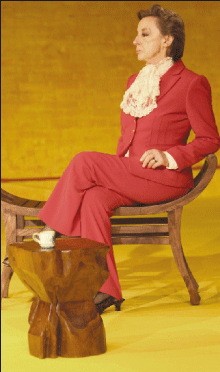By Scott Harrah
For a play with such a stellar cast — four-time Tony winner Zoe Caldwell, Broadway veterans Dennis O’Hare, Larry Pine, and Linda Emond — “A Spanish Play” is a major letdown. Playwright Yazmina Reza, best known for her hits “Life x 3” and “Art,” has written a confusing pastiche of existential psychobabble, dark humor, multimedia imagery, and nonsensical dialogue that never quite takes off.
The concept of a play within a play in dramatic literature is nothing new and was perfected in such classics as Luigi Pirandello’s “Six Characters in Search of An Author.” However, it is tough to pinpoint what Pirandellian ideas that Reza is in search of here. In “A Spanish Play,” she tells the story of a dysfunctional family — normally a great concept for a domestic dramedy — but there is simply too much going on here, and even for a one act that is less than two hours, nothing really gets resolved. Larry Pine plays Fernan, a real-estate property manager and recent widower who’s become quite fond of Pilar (Zoe Caldwell), the elderly mother of actresses Aurelia (Linda Emond) and Nuria (Katherine Borowitz), both of whom are rehearsing for a play. Aurelia has marital problems with her alcoholic actor husband Mariano (Denis O’Hare), and Nuria spends most of the play deciding which designer outfit to wear to an awards show. (Her modeling of some hilariously bad fashions is one of the show’s few bright, amusing spots.) The ups and downs of everyone’s mundane lives keep interfering with the rehearsal of the play within the play, but trying to figure just what is happening in each scene is a major obstacle for audiences.
There is no real set other than a few chairs and walls and a floor covered in yellow and red paint, helping set a surreal tone. Absurdist, experimental theater in intimate venues can truly be an engaging experience if done well, but the trouble is that Reza’s narrative is so unfocused that it simply rambles all over the place. Actors sometimes break character and speak about their feelings on being a thespian to the audience, but it is difficult to understand exactly what they are blathering about because it is sometimes merely stream-of-consciousness drivel. In addition, there are numerous scenes shown offstage — including the bathroom — via live video camera. Although this is initially intriguing and stylistic, in the end these sequences are frustrating and confusing and turn out to be nothing more than flashy gimmickry that adds little to the story.
What could have been a simple tale about an ordinary man wishing to marry into a family of show-business bohemians — with some insightful commentary on the shortcomings of life — just seems unnecessarily hard to follow. David Ives translated the script, originally written in French, into English. One is left wondering if some of the obtuse elements of the story were, to use a cliché, “lost in translation,” but it is doubtful Reza’s narrative would make sense in any language. There is simply no need to make the drama seem more profound than it is by using videos and having actors talk out of character in an attempt to appear avant-garde. Director John Turturro’s clever staging of the show might have been effective if anyone could comprehend the convoluted plot.
The venerable actors, all of whom give solid performances, do their best to keep the whole show from collapsing through its thematic flaws — Caldwell and Pine are exquisite and first-rate as usual — but Reza’s pseudo-intellectual pretensions are simply impossible to overcome.





































